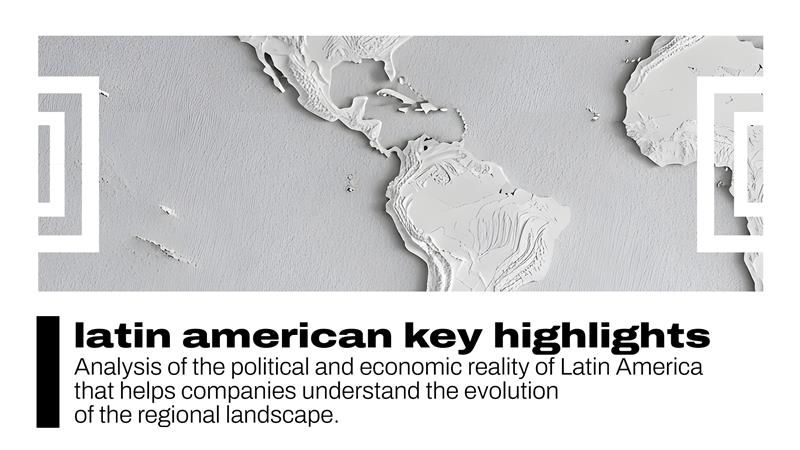
Latin American Keys is an informative and analytical summary regarding the political and economic situation in the Latin American region. These key takeaways, prepared monthly by ATREVIA´s Analysis and Research team, serve to be a useful tool in understanding the evolution of the political-institutional state of Latin America.
Over the past month, the region has witnessed highly significant political, social, and diplomatic developments, while the economy remained, overall, relatively stable.
Argentina regained a degree of financial calm following Javier Milei’s victory in the legislative elections, a result that paves the way for U.S. financial aid previously conditioned by Donald Trump on this outcome. In contrast, Trump’s relationship with Colombian President Gustavo Petro remains deeply strained, leading to Petro’s inclusion on the Clinton List of individuals linked to drug trafficking. Meanwhile, the Colombian government has revived the idea of a Constituent Assembly to break the deadlock on key reforms.
In Ecuador, the possibility of moving toward a constitutional process is higher, depending on the outcome of the public referendum scheduled for November 16. The country also concluded a 31-day national strike sparked by the elimination of the diesel subsidy.
Social unrest continues in Peru amid the political instability triggered by the removal of Dina Boluarte due to the security crisis. José Jerí, president of Congress, has assumed office as interim president until 2026. Chile, for its part, will also soon elect a new president, and according to polls, Communist candidate Jeannette Jara and far-right leader José Antonio Kast are likely to face off in a runoff set for December 14.
On the economic front, inflation in Brazil remains above the target range, with the water crisis now driving up energy prices. The benchmark interest rate has held steady at 15% since June. Similarly, inflation in Mexico continues to rise, and the Bank of Mexico has warned that newly approved taxes could add further pressure. The government also plans to raise the minimum wage by up to 14% in 2026.
In Uruguay, inflation remains within the Central Bank’s target range, and the country has cut interest rates to accelerate monetary easing. It also made history by becoming the first nation in Latin America to legalize euthanasia through parliamentary approval. Meanwhile, Paraguay’s economy continues to perform well, though social protests persist — particularly among young people denouncing corruption.
Finally, Brussels is preparing to sign the EU–Mercosur agreement on December 5, while also strengthening cooperation with Latin America and the Caribbean in science, innovation, and the fight against organized crime.